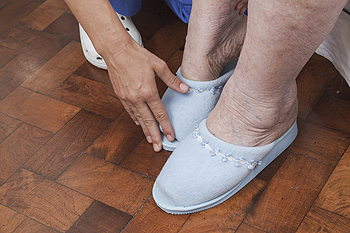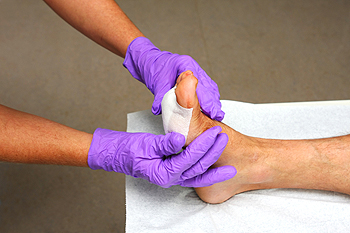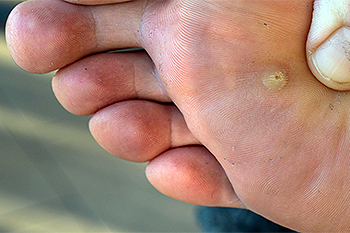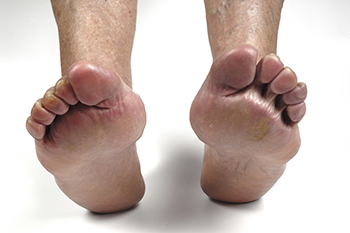November 2023
How Aging Can Affect Your Feet

As time passes, the body undergoes natural changes, and our feet are no exception. Subjected to a lifetime of impact, weight-bearing and pressure, your feet gradually transform, affecting their strength and resilience. One noticeable change brought on by aging is the thinning of the skin, reducing natural cushioning and making the feet more vulnerable to damage. Joints in the feet undergo wear and tear, leading to conditions like osteoarthritis. Joints become less flexible, causing the foot to lose its springiness and ability to absorb impact. Muscle strength, which peaked in your 20s and early 30s, gradually diminishes with age. Regular exercise slows this decline and helps to maintain overall foot health. Swelling, a common issue with age, increases pressure on the foot's structures. Poor circulation, often associated with conditions such as atherosclerosis, affects the blood supply to the feet and reduces their ability to repair minor injuries quickly. Toenails also undergo changes, becoming thicker and more brittle as growth slows. Conditions like hypothyroidism and peripheral arterial disease can make this worse. For help in managing foot problems associated with aging, it is suggested that you make an appointment with a podiatrist.
Proper foot care is something many older adults forget to consider. If you have any concerns about your feet and ankles, contact Dawn Miles, DPM from Florida. Our doctor can provide the care you need to keep you pain-free and on your feet.
The Elderly and Their Feet
As we age we start to notice many changes in our body, but the elder population may not notice them right away. Medical conditions may prevent the elderly to take notice of their foot health right away. Poor vision is a lead contributor to not taking action for the elderly.
Common Conditions
- Neuropathy – can reduce feeling in the feet and can hide many life-threatening medical conditions.
- Reduced flexibility – prevents the ability of proper toenail trimming, and foot cleaning. If left untreated, it may lead to further medical issues.
- Foot sores – amongst the older population can be serious before they are discovered. Some of the problematic conditions they may face are:
- Gouging toenails affecting nearby toe
- Shoes that don’t fit properly
- Pressure sores
- Loss of circulation in legs & feet
- Edema & swelling of feet and ankles
Susceptible Infections
Diabetes and poor circulation can cause general loss of sensitivity over the years, turning a simple cut into a serious issue.
If you have any questions please feel free to contact one of our offices located in Palatka and Saint Augustine, FL . We offer the newest diagnostic and treatment technologies for all your foot and ankle needs.
Managing Chronic Wounds

Chronic wounds on the lower legs, feet, and toes demand a specialized approach from podiatrists to ensure optimal healing. The process begins with cleaning of the wound and removing any debris. In cases of traumatic injury, a podiatrist may recommend a tetanus vaccination to prioritize your safety. This foot doctor may surgically remove dead skin and close wounds with stitches or staples. Dressing choices for chronic wounds are critical, often leaning toward moist dressings tailored to specific wound characteristics. Vigilant monitoring for signs of infection is a key responsibility, with prescribed antibiotics and antimicrobial dressings essential for effective control. A thorough review of patient medications and adjusting as needed, is essential for patient safety. Specific wounds like ulcers may require specialized treatments, including antibiotics or skin grafts. In cases where poor blood supply hampers healing, a podiatrist may recommend vascular surgery to improve circulation. If you are experiencing chronic foot wounds, it is suggested that you schedule an appointment with a podiatrist for a comprehensive treatment plan.
Wound care is an important part in dealing with diabetes. If you have diabetes and a foot wound or would like more information about wound care for diabetics, consult with Dawn Miles, DPM from Florida. Our doctor will assess your condition and provide you with quality foot and ankle treatment.
What Is Wound Care?
Wound care is the practice of taking proper care of a wound. This can range from the smallest to the largest of wounds. While everyone can benefit from proper wound care, it is much more important for diabetics. Diabetics often suffer from poor blood circulation which causes wounds to heal much slower than they would in a non-diabetic.
What Is the Importance of Wound Care?
While it may not seem apparent with small ulcers on the foot, for diabetics, any size ulcer can become infected. Diabetics often also suffer from neuropathy, or nerve loss. This means they might not even feel when they have an ulcer on their foot. If the wound becomes severely infected, amputation may be necessary. Therefore, it is of the upmost importance to properly care for any and all foot wounds.
How to Care for Wounds
The best way to care for foot wounds is to prevent them. For diabetics, this means daily inspections of the feet for any signs of abnormalities or ulcers. It is also recommended to see a podiatrist several times a year for a foot inspection. If you do have an ulcer, run the wound under water to clear dirt from the wound; then apply antibiotic ointment to the wound and cover with a bandage. Bandages should be changed daily and keeping pressure off the wound is smart. It is advised to see a podiatrist, who can keep an eye on it.
If you have any questions, please feel free to contact one of our offices located in Palatka and Saint Augustine, FL . We offer the newest diagnostic and treatment technologies for all your foot care needs.
Definition and Risk Factors of Plantar Warts

Plantar warts, small growths caused by the human papillomavirus, or HPV, often appear on the soles of the feet. Unlike common warts, which typically grow on the hands, plantar warts can be painful due to the pressure exerted on the soles when walking or standing. These warts may have a rough, grainy appearance with tiny black dots, which are actually clotted blood vessels. Several risk factors increase the likelihood of developing plantar warts. Close contact with the virus, such as walking barefoot in damp and communal areas like locker rooms, swimming pools, or public showers, can put your feet at risk. Additionally, those with a weakened immune system, such as individuals with diabetes or HIV, are more susceptible to plantar warts. Constantly moist or sweaty feet can provide an ideal environment for the virus to thrive. If you have developed a plantar wart, it is strongly suggested that you consult a podiatrist who can provide relief with appropriate treatment methods.
Plantar warts can be very uncomfortable. If you need your feet checked, contact Dawn Miles, DPM from Florida. Our doctor will assist you with all of your foot and ankle needs.
About Plantar Warts
Plantar warts are the result of HPV, or human papillomavirus, getting into open wounds on the feet. They are mostly found on the heels or balls of the feet.
While plantar warts are generally harmless, those experiencing excessive pain or those suffering from diabetes or a compromised immune system require immediate medical care. Plantar warts are easily diagnosed, usually through scraping off a bit of rough skin or by getting a biopsy.
Symptoms
- Lesions on the bottom of your feet, usually rough and grainy
- Hard or thick callused spots
- Wart seeds, which are small clotted blood vessels that look like little black spots
- Pain, discomfort, or tenderness of your feet when walking or standing
Treatment
- Freezing
- Electric tool removal
- Laser Treatment
- Topical Creams (prescription only)
- Over-the-counter medications
To help prevent developing plantar warts, avoid walking barefoot over abrasive surfaces that can cause cuts or wounds for HPV to get into. Avoiding direct contact with other warts, as well as not picking or rubbing existing warts, can help prevent the further spread of plantar warts. However, if you think you have developed plantar warts, speak to your podiatrist. He or she can diagnose the warts on your feet and recommend the appropriate treatment options.
If you have any questions please feel free to contact one of our offices located in Palatka and Saint Augustine, FL . We offer the newest diagnostic and treatment technologies for all your foot and ankle needs.
Understanding Rheumatoid Arthritis in the Feet

Rheumatoid arthritis, abbreviated RA, is a systemic autoimmune disorder that can have a significant impact on various parts of the body, including the feet. While it is known for joint pain and inflammation, RA's effects on the feet are particularly noteworthy. This condition can lead to deformities in the feet, such as bunions and hammertoes, causing pain and difficulty walking. RA can also cause joint swelling and tenderness in the ankles and the joints that connect the foot to the toes, known as metatarsophalangeal joints. Over time, untreated RA can result in joint erosion and severe damage to the feet, severely limiting mobility. Another critical aspect is the role of early diagnosis and treatment. Addressing RA promptly can help manage symptoms and slow the progression of the disease in the feet. Regular visits to a podiatrist are essential for those living with RA to ensure proper foot care. Understanding the facts about rheumatoid arthritis in the feet is vital for those who may be affected, as it can lead to more effective management and an improved quality of life. If you have rheumatoid arthritis that is affecting your feet, it is strongly suggested that you are under the care of a podiatrist who can offer you appropriate management tips.
Because RA affects more than just your joints, including the joints in your feet and ankles, it is important to seek early diagnosis from your podiatrist if you feel like the pain in your feet might be caused by RA. For more information, contact Dawn Miles, DPM of Florida. Our doctor will assist you with all of your podiatric concerns.
What Is Rheumatoid Arthritis?
Rheumatoid Arthritis (RA) is an autoimmune disorder in which the body’s own immune system attacks the membranes surrounding the joints. Inflammation of the lining and eventually the destruction of the joint’s cartilage and bone occur, causing severe pain and immobility.
Rheumatoid Arthritis of the Feet
Although RA usually attacks multiple bones and joints throughout the entire body, almost 90 percent of cases result in pain in the foot or ankle area.
Symptoms
- Swelling and pain in the feet
- Stiffness in the feet
- Pain on the ball or sole of feet
- Joint shift and deformation
Diagnosis
Quick diagnosis of RA in the feet is important so that the podiatrist can treat the area effectively. Your doctor will ask you about your medical history, occupation, and lifestyle to determine the origin of the condition. Rheumatoid Factor tests help to determine if someone is affected by the disease.
If you have any questions please feel free to contact one of our offices located in Palatka and Saint Augustine, FL . We offer the newest diagnostic and treatment technologies for all your foot and ankle needs.










